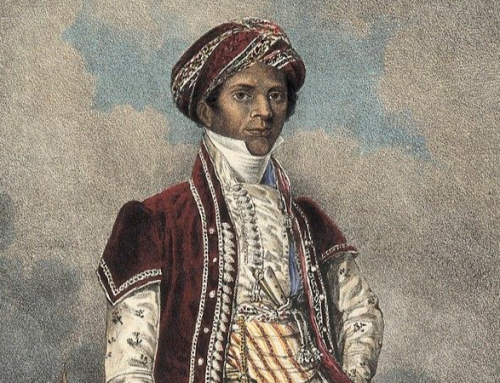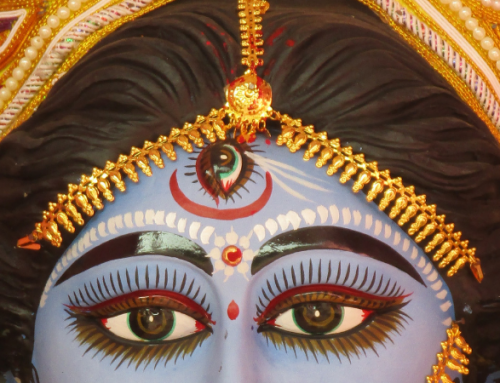Ancestor Fortnight Begins Today
 From the abundantly favorable to the significantly inauspicious: such is the ambit of the lunar month of Bhadrapada. Now that Ganapatideva has been respectfully returned to his home, with the request to return soon next year, the time has come for us to revere our ancestors, during the Pitr Paksha (the “Forefather Fortnight”). The Sanatana Dharma, which has always estimated human obligations to be greater than any rights or privileges, emphasizes the signal importance of repaying our genetic (and epigenetic) debt to our forebears via Tarpaṇa and Śrāddha, rituals which can be performed at any time (preferably when the moon is waning) but ideally during the Pitru Paksha. Given that we owe our very existence to our parents, their parents and their parents before them, it is only appropriate that we annually invest some time and effort appreciating them for what they have given (and done to) us.
From the abundantly favorable to the significantly inauspicious: such is the ambit of the lunar month of Bhadrapada. Now that Ganapatideva has been respectfully returned to his home, with the request to return soon next year, the time has come for us to revere our ancestors, during the Pitr Paksha (the “Forefather Fortnight”). The Sanatana Dharma, which has always estimated human obligations to be greater than any rights or privileges, emphasizes the signal importance of repaying our genetic (and epigenetic) debt to our forebears via Tarpaṇa and Śrāddha, rituals which can be performed at any time (preferably when the moon is waning) but ideally during the Pitru Paksha. Given that we owe our very existence to our parents, their parents and their parents before them, it is only appropriate that we annually invest some time and effort appreciating them for what they have given (and done to) us.
Śrāddha is relatively more complicated, and Tarpaṇa relatively less so, but both aim to offer contentment (trpti, a word closely related to the word tarpaṇa) to the deceased. Many are rules for such offerings, and many the locations in India (including particularly Varanasi, Badrinath and Gaya) where these offerings are said to produce superlative effects; but Vimalananda (who offered choice insults to those priests who charge exorbitant sums for performing such ceremonies) maintained that in this context (as in most contexts), simpler is better (though he did concur with the pundits that these rites should always be done between dawn and noon, and preferably on the banks of a body of water). While it is optimal to hire a specialist to perform Śrāddha for your deceased loved ones, most anyone (according to V) can perform Tarpaṇa (procedures for which can be found here.)
In Sanskrit Śrāddha literally means an action performed with full faith (Śraddhā). For Śrāddha to be effective you need to have faith that it can in some way be effective. You might believe that the shades of your dead parents actually come to the event and consume the offerings, or that you are in fact making an offering to their genes and chromosomes that continue to live within you, or simply that by rendering heartfelt gratitude towards your ancestors and praying for their well-being and peace you are nourishing your own gratitude, well-being and peace. The key is that any offering should be “heartfelt”; the words Śrāddha and Śraddhā sprout from a root that in English gave us “heart”.
Our hearts and their feeling explain why the Pitr Paksha is regarded as one of the least propitious periods of the year. Just because a human dies does not mean that that human has lost all interest in living; in fact, in the vast majority of deaths, the dying continue to grasp at life even as life departs from them. Dead personalities usually crave a return to the pleasures that they enjoyed while alive, and the affinity that exists between their now-defunct bodies and the bodies of their descendants often permits them to express some of these desires (to some extent) through the bodies of those very scions, via a process that possibly shares some similarities with the process through which a transplanted organ (particularly a heart) can “transplant” important characteristics of the donor into the recipient.
If your departed relative was a great saint, you might perhaps find benefit in having him or her continue to live through you; otherwise, it is more likely that strong ancestral influence on you will transfer to you extra negative traits, or at the reinforce some of your pre-existing negative traits. Most authorities agree that the pitrs are not “liberated” but rather “appeased” through Tarpaṇa and Śrāddha. This brings up the interesting question (recently posed to me) of whether it would not be more beneficial for we the living to perform some sadhana on behalf of those in our maternal & paternal lineages, to assist them to evolve further even while (presumably) also removing their negative effects on us? The answer is IMO a cautious and qualified “yes”, qualified by how much stability in your own self you have already achieved thanks to your own sadhana. If you have already become a saint you may be able to release many of your progenitors from their desire-bondages; if not, the act of you focusing on them further may make your awareness further deteriorate, often without you being in the least aware of that deterioration.
And, frankly, any ancestor that is still in need of contentment should first become contented before we try to enlighten them; as Tukaram Maharaj is reported to have said, pahile pothoba ani nantar Vithoba, “first worship the belly god (i.e. address all your human needs and desires) before you try to worship the Supreme God.” Wise advice.
May all our ancestors become content!


